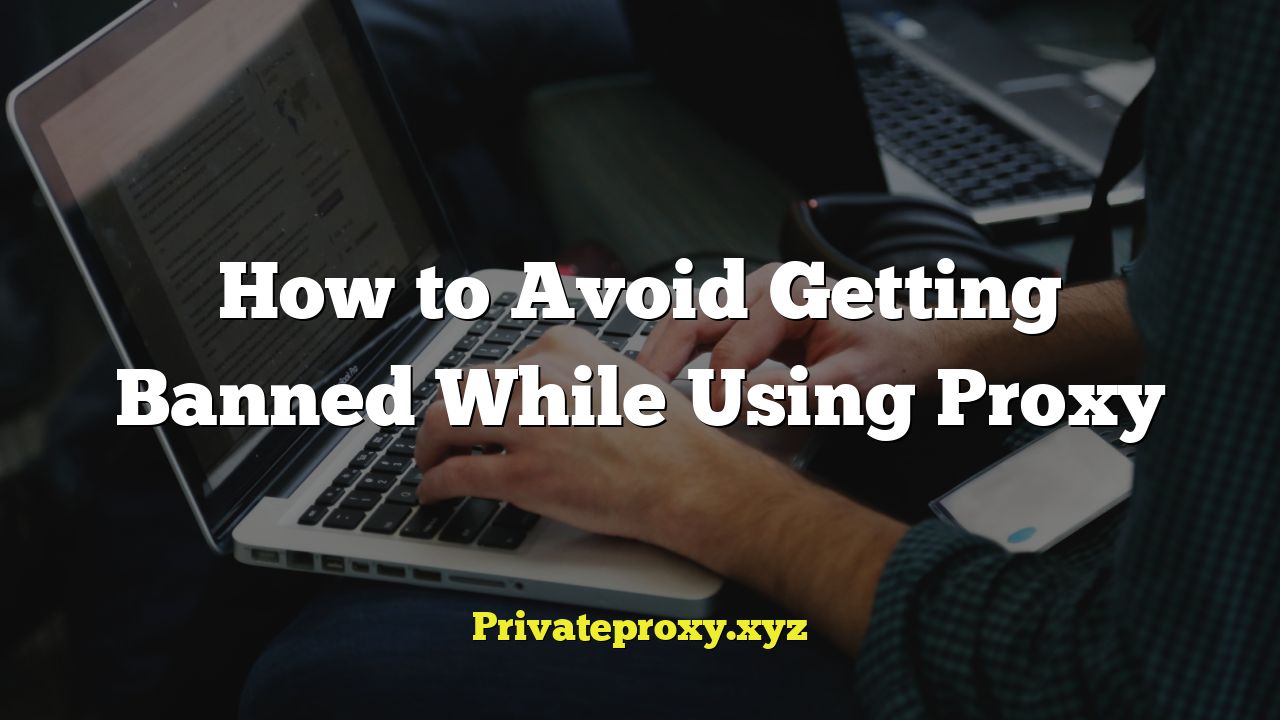
Understanding Proxies and Bans: A Delicate Balance
Proxies are powerful tools that allow users to mask their IP address, enabling them to access geo-restricted content, scrape data, automate tasks, and enhance privacy. However, improper proxy usage can lead to bans, negating the benefits and potentially causing significant disruptions. Avoiding bans requires a comprehensive understanding of how websites detect and prevent proxy use, and adopting best practices to minimize your digital footprint.
Why Websites Ban Proxies
Websites ban proxies for various reasons, often to protect their services, prevent abuse, and maintain a fair user experience. Understanding these motivations is crucial for formulating effective avoidance strategies.
* Preventing Scraping: Many websites actively discourage automated data extraction, known as web scraping. Proxies are frequently used to bypass rate limits and scrape large amounts of data, potentially overloading the server and violating terms of service.
* Combating Spam and Fraud: Proxies are often employed to create fake accounts, spread spam, and commit fraudulent activities. Websites implement proxy detection to prevent such malicious behaviors.
* Enforcing Geo-Restrictions: Streaming services, online retailers, and other platforms use geo-restrictions to limit access based on location. Proxies allow users to circumvent these restrictions, which can violate licensing agreements and copyright laws.
* Maintaining Server Stability: Excessive requests from a single IP address, often facilitated by proxies, can overwhelm a website’s server, leading to slowdowns and service disruptions.
* Protecting Against DDoS Attacks: Distributed Denial of Service (DDoS) attacks involve flooding a server with requests from multiple sources. Proxies can be used to amplify these attacks, making it difficult to identify and block the source.
Types of Proxies and Their Risk Levels
Not all proxies are created equal. The type of proxy you choose significantly impacts your risk of getting banned.
* Free Proxies: These are readily available but often unreliable and risky. They are typically slow, overloaded, and frequently blacklisted. Free proxies are often used for malicious purposes, further increasing the likelihood of detection. Using them is generally discouraged for anything beyond casual browsing.
* Shared Proxies: Multiple users share the same IP address with shared proxies. While more reliable than free proxies, they are still prone to bans due to the actions of other users. If one user engages in abusive behavior, the entire IP address can be blacklisted.
* Dedicated Proxies: These proxies are assigned exclusively to one user, providing greater control and reliability. Because you are the only one using the IP address, you are less likely to be banned due to the actions of others. Dedicated proxies are a good option for tasks that require higher levels of privacy and security.
* Rotating Proxies: These proxies automatically switch IP addresses at regular intervals, making it difficult to track and ban your activity. Rotating proxies are ideal for tasks like web scraping and automation, where maintaining anonymity is crucial.
* Residential Proxies: Residential proxies use IP addresses assigned to real residential internet service providers (ISPs). These IP addresses are less likely to be flagged as proxies because they appear to originate from legitimate users. Residential proxies are generally considered the most reliable and least likely to be banned, but they also tend to be more expensive.
* Datacenter Proxies: Datacenter proxies originate from data centers and are typically cheaper than residential proxies. However, they are easier to detect because they are not associated with real residential addresses. Datacenter proxies are suitable for tasks where anonymity is not critical.
Key Strategies to Avoid Proxy Bans
Implementing these strategies significantly reduces your risk of getting banned while using proxies.
* Choose Reputable Proxy Providers: Thoroughly research proxy providers before subscribing. Look for providers with a good reputation, reliable service, and a wide range of IP addresses. Read reviews and testimonials to get an idea of their performance and customer support.
* Use High-Quality Proxies: Opt for dedicated, rotating, or residential proxies whenever possible. While they may be more expensive, the increased reliability and reduced risk of bans are well worth the investment. Avoid free and shared proxies unless you are performing low-risk tasks.
* Rotate Your Proxies: Regularly rotate your IP addresses to avoid triggering suspicious activity patterns. Configure your proxy settings to automatically switch IPs at predefined intervals. The appropriate rotation interval depends on the task you are performing and the website you are accessing.
* Implement Request Delays (Throttling): Avoid sending requests too quickly. Implement delays between requests to mimic human behavior and avoid overwhelming the server. This is particularly important when scraping data or automating tasks. Adjust the delay based on the website’s response and perceived sensitivity.
* Use Realistic User Agents: User agents identify the browser and operating system used to access a website. Using generic or outdated user agents can raise red flags. Use a variety of realistic user agents to mask your activity and appear as a legitimate user. Regularly update your user agent list to stay current.
* Manage Cookies Effectively: Cookies are small text files that websites use to track user activity. Clearing cookies regularly can help prevent websites from identifying and tracking you. Configure your browser or proxy settings to automatically clear cookies after each session.
* Respect robots.txt: The robots.txt file instructs web crawlers which parts of a website should not be accessed. Adhering to the rules outlined in robots.txt demonstrates respect for the website’s guidelines and reduces the risk of being blocked.
* Monitor Your Proxy Usage: Keep a close eye on your proxy usage and identify any potential issues early on. Monitor your bandwidth consumption, request rates, and error logs. If you notice any unusual activity, investigate the cause and take corrective action.
* Use CAPTCHA Solving Services: CAPTCHAs are designed to distinguish between humans and bots. Encountering CAPTCHAs frequently can indicate that your activity is being flagged as suspicious. Integrate CAPTCHA solving services into your workflow to automatically solve CAPTCHAs and avoid interruptions.
* Geographically Diversify Your Proxies: Distribute your proxy IP addresses across different geographic locations. This helps to mask your true location and avoid triggering geo-restriction measures. Choose proxy providers that offer a wide range of geographic locations.
* Limit Concurrent Connections: Reduce the number of simultaneous connections you are making through your proxy. Excessive concurrent connections can overload the server and raise suspicion. Configure your proxy settings to limit the number of concurrent connections to a reasonable level.
* Avoid High-Risk Activities: Be mindful of the types of activities you are performing through your proxy. Avoid engaging in activities that are known to be heavily monitored or restricted, such as spamming, hacking, or illegal downloading.
* Test Your Proxies Regularly: Periodically test your proxies to ensure they are working correctly and not blacklisted. Use online tools or scripts to check the IP address, location, and anonymity level of your proxies. Replace any proxies that are not performing optimally.
* Use Anti-Detect Browsers: Anti-detect browsers are specifically designed to prevent websites from fingerprinting your browser and tracking your activity. They allow you to spoof various browser parameters, such as user agent, screen resolution, and operating system.
Advanced Techniques for Anonymity
For tasks requiring the highest levels of anonymity, consider these advanced techniques:
* Proxy Chains: Chain multiple proxies together to create a more complex and untraceable path. This makes it more difficult for websites to identify your true IP address. However, proxy chains can also slow down your connection speed.
* Tor Network: The Tor network is a decentralized network of relays that encrypts and anonymizes your internet traffic. While Tor provides a high level of anonymity, it can also be slow and unreliable.
* VPNs with Proxy Support: Some VPN providers offer proxy support, allowing you to combine the benefits of VPN encryption with proxy IP masking. This can provide an extra layer of security and anonymity.
* Custom Proxy Scripts: Develop custom proxy scripts to automate tasks like proxy rotation, user agent management, and request throttling. This allows you to tailor your proxy usage to specific websites and tasks.
Dealing with Bans: Recovery and Prevention
Even with the best precautions, you may still encounter bans. Here’s how to respond and prevent future occurrences:
* Identify the Cause: Determine the reason for the ban. Was it due to excessive requests, a blacklisted IP address, or some other factor? Understanding the cause is crucial for preventing future bans.
* Request Unbanning: Some websites offer a process for appealing bans. If you believe you have been unfairly banned, submit a request for unbanning. Explain your situation and provide any relevant information.
* Replace Banned Proxies: Immediately replace any proxies that have been banned. Do not continue using them, as this will only exacerbate the problem.
* Adjust Your Strategy: Based on the cause of the ban, adjust your proxy usage strategy. Implement more aggressive request delays, rotate your proxies more frequently, or use a different type of proxy.
* Monitor Your Reputation: Use online tools to monitor your IP address reputation. This can help you identify if your IP address has been blacklisted by any websites or services.
Legal and Ethical Considerations
Always use proxies responsibly and ethically. Be aware of the legal and ethical implications of your actions.
* Respect Terms of Service: Adhere to the terms of service of any website you are accessing. Do not use proxies to violate these terms.
* Avoid Illegal Activities: Never use proxies to engage in illegal activities, such as hacking, fraud, or copyright infringement.
* Disclose Proxy Usage: If you are required to disclose your proxy usage, do so honestly and transparently.
Conclusion
Avoiding proxy bans requires a proactive and multifaceted approach. By understanding the reasons why websites ban proxies, choosing the right type of proxy, implementing best practices, and continuously monitoring your activity, you can significantly reduce your risk of getting banned and enjoy the benefits of using proxies responsibly. Remember to always prioritize ethical and legal considerations when using proxies.


